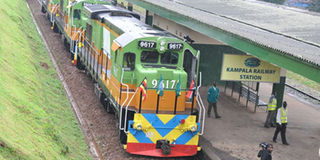Trains grounded as over 400 RVR workers strike

An RVR train wagon at the Kampala rail station. FILE PHOTO
What you need to know:
In 2007, a 25-year concession was signed between RVR, previously Uganda Railways Corporation (URC), and the government of Kenya regarding the management of the over 2,000-kilometre track from Mombasa to Kampala
Since then, however, RVRU workers and management have endured toxic hostilities
Over 400 workers of Rift Valley Railways Uganda (RVRU), a consortium established in 2006 to manage the parastatal railways of Kenya and Uganda, have gone on strike citing non-payment of June and July salaries.
The strike that started on July 26 has since paralysed commuter freight and passenger rail services, left locomotives across the five stations of Kampala, Jinja, Iganga, Busembatia and Tororo grounded, and a trail of losses among the business community in its wake.
Admittedly, passengers who usually use the Kampala-Namanve train as a cheap alternative transport are stranded, while companies such as Roofings, Bidco Uganda Limited, Inter Freight, oil companies among other transporters, are counting losses.
Some businessmen on Thursday told Daily Monitor that with the Kenyan general elections on the horizon, they want the Nairobi-based RVRU to refund their money since their goods have not been delivered, reckoning that their goods are ‘safer’ if they cross the borders before the elections.
According to Mr Victor Byemaro, the General Secretary of the Uganda Railways Workers’ Union, workers laid down their tools after going for two months without pay. They also want management to clarify on the issue of the Provident Fund. Provident fund is a form of social safety net into which workers must contribute a portion of their salaries and employers must contribute on behalf of their workers.
However, Mr Isaiah Okoth, the RVR Group Chief Executive Officer on Thursday said that Ugandan workers have simply ‘boycotted’ work.
He said: “Because the unions have stated that they did not call a strike and RVR management wasn’t notified as per labour laws, our position is that Uganda workers are not on strike but have boycotted work since June 26.”
According to Mr Okoth the delay in remitting June & July salaries was as a result of various RVRU supplier court orders that required RVR to make additional payments that had not been budgeted. This, he said, was further worsened by the poor cash collection by the RVRU team.
“This model worked well until May 2017 when we received a letter from RVRU lawyers demanding the payment of all outstanding Provident Fund payments. We thereupon informed all RVRU staff members that payment of all outstanding Provident Fund payments would delay the June salary payments,” he said.
He said: “After receiving approval from RVRU staff that we should prioritise outstanding Provident Fund payment over June salaries, payment of outstanding Provident Fund payment was effected with the agreement that RVRU commercial team would expedite the collection of outstanding receivables of over US$200,000 from Uganda clients to ensure payment of June salaries before end of July.”
He said that on June July 26 and without warning or having collected outstanding payment from Uganda clients as agreed, RVRU management informed the Executive Committee that the entire RVRU staff was on strike demanding salary payment for both June and July - which hadn’t ended.
While Mr Byemaro is adamant that they will only call off their strike once their grievances have been ‘satisfactorily met’, Mr Okoth thinks otherwise.
“Since RVRU team hasn’t been able to collect outstanding payments from Uganda clients, we have had to redirect cash from other activities to ensure that RVRU employees receive at least one month salary. We are hopping RVRU team will get back to work at the earliest opportunity, deliver goods to our key clients quickly, collect additional cash and thus enable us to process July salary payments,” Mr Okoth said.
In 2007, a 25-year concession was signed between RVR, previously Uganda Railways Corporation (URC), and the government of Kenya regarding the management of the over 2,000-kilometre track from Mombasa to Kampala.
Since then, however, RVRU workers and management have endured toxic hostilities.
In 2011, their workers went on a sit-down strike demanding a salary increment and payment of their salary arrears dating back to five years.
In 2012, more than 700 workers began a sit down strike following threats by management to lay off 200 employees allegedly without following terms agreed upon with the Uganda Railway Workers Union Members collective bargaining agreement.
In 2016, over 500 employees went on a sit-down strike citing unfair treatment and arbitrary dismissal of workers.




